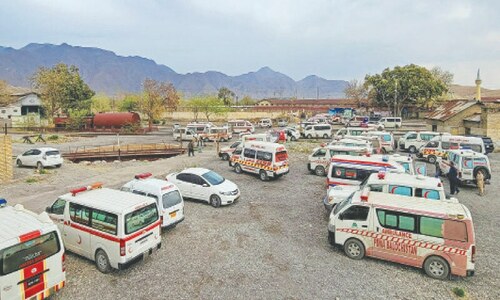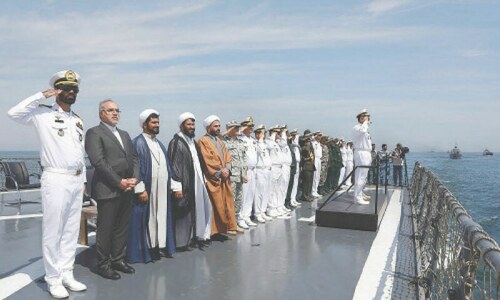THE closest to Syed Tasawar Hussain’s craft is a spider busily weaving a web.
Hussain, 28, sits in a hall at Phedra, a sports goods factory in Sialkot’s Industrial Estate. Every now and then, he pulls out a hexagonal leatherite panel to stitch into the patchwork that is a football’s skin.
Eighteen years of stitching footballs has synchronised Hussain’s hands and mind into a needlework sequence that is impressive in its precision. He thrusts needles held in both hands into alternate holes, stitch after deft stitch. He finishes with a tight pull at the twine, neatly suturing the hexagonal panels together.
“Football stitch-work has spread out from Sialkot into surrounding districts,” says Hussain, inserting a bladder in the football body, synchronising the hole in the bladder with the one in the football coat and beginning the “toughest part of his job”: stitching together the last two of the 32 panels. “Labour is cheap elsewhere. Workers from all over also come here.”
For decades, Sialkot has been putting Pakistan on the map of the world’s leading football manufacturing countries. Since the Fifa World Cup 1982 in Barcelona, Spain, when the Sialkot-based Sublime Soccer manufactured the official handmade match ball Tango for Adidas, the rise of local football industry has been heady.
Sialkot’s repute as a major sports goods hub harks back to British India. Traditionally, the people of Sialkot have been craftsmen, specialising in merchandise as diverse as surgical goods, music instruments, cutlery and leather goods.
“The first export of a football from Sialkot was to Singapore in 1922,” says Prof Safdar Sandal, CEO of Phedra Industries, whose father had sports warehouses in Bombay, Lucknow and Colombo. “The first generations of football-makers were Muslim craftsmen working with industries owned by Hindus. These craftsmen became second-generation manufacturers after Partition. The third-generation manufacturers became ambassadors for Sialkot, exploring foreign markets in the ’80s and ’90s. The fourth generation today is the younger, tech-savvy lot. They didn’t just bring in foreign brands but also created their own.”
The city now boasts over 2,000 small- and medium-scale industrial units manufacturing footballs. Until 2007, Pakistan used to export some 40 million footballs annually, with the Sialkot industry covering 45pc of the world’s demand for hand-stitched footballs.
With Fifa announcing new standards in 2006, the local industry that heavily relied on hand-stitched footballs suffered a reversal of fortunes. “There was a snag between 2009 and 2013 when the focus shifted from handmade to machine-made and then thermo-bonded footballs,” says Professor Sandal. “Sialkot lagged behind because we didn’t have the technology.”
Since then, the demand for hand-stitched footballs has dipped by nearly half. With foreign companies reluctant to place orders with manufacturers that employed child labour and Pakistan not able to keep up with the new mechanised standards, the global market became dominated by manufacturers from China, Thailand, India and Hong Kong. It was a sombre moment for football manufacturers in Sialkot when in the Fifa World Cup 2010, Pakistan’s handmade Teamgiest lost to China’s machine-made Jabulani.
Come 2014, though, and the mood in a city that boasts a golden monument of a football atop a trophy at its heart is upbeat. Forward Sports, a local football manufacturer that has worked with leading international sports brands since its inception in 1990, has clinched the deal to supply Brazuca, the Official Match Football of Adidas for the 2014 Fifa World Cup. According to Phaedra’s Prof Sandal, 42 million footballs will be exported from Sialkot-based industries ahead of the World Cup.
Khawaja Masood Akhtar, the CEO of Forward Sports, tries to keep a calm appearance as he rushes through a gruelling routine juggling foreign delegations, keeping appointments with national and international media representatives and, of course, sample-testing individual Brazuca balls produced at the factory.
“We already had the technology since we were producing footballs for several [champion] leagues but Brazuca is a different ball altogether,” he says. It comprises six panels — not geometric but artistic — that are thermo-bonded together. “Adidas wanted machinery developed for customised production. We only had 33 days for something that takes at least six months. The machines we developed are without human touch, computer-operated and high precision.”
Sialkot brings $1.65bn annually through exports and aims to increase this by $15bn by 2025 through diversifying export products. It has allayed international concerns about child labour and labour standards. Major international certification agencies based in the city provide consultancies on international standards. The city’s industrialists have also built an international airport and a dry port.
“The government needs to create a nucleus where international models can be adopted and created, where workers can come together to learn and display their expertise,” says Sarfaraz Bashir, president of the Sialkot Chamber of Commerce and Industries. “When machine-made footballs became the new international standard, we created the Sports Industries Development Centre to embrace technical evolution. With time, international players found that machine-made footballs were not all what they were hyped to be, so we continue producing machine- and handmade footballs.”
Why, then, for a country that excels in producing footballs for champion leagues, have we hardly any players to boast of? “Halwai apnay hath ka banaya hua halwa nahi khata,” says Prof Sandal — the confectioner doesn’t eat his own fare. “However, things are changing. Once we used to have street cricket. Now I see the kids playing football in the playground next to my house. So there is hope that we will have a team of our own one day.”
Published in Dawn, May 30th, 2014













































